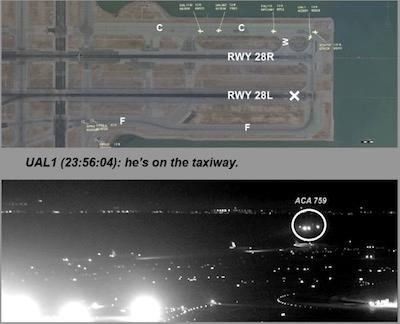Thu, Sep 27, 2018
Descended To An Altitude Of Just 100 Feet AGL Before Initiating Go-Around
The NTSB determined Tuesday an Air Canada flight crew’s lack of awareness caused the July 7, 2017, overflight of a taxiway at San Francisco International Airport (KSFO).

Air Canada flight 759 was cleared to land on runway 28R but instead lined up with parallel taxiway C where four airplanes were awaiting clearance to take off. Flight 759 descended to an altitude of 100 feet above ground level and overflew the first of the four airplanes. The flight crew initiated a go-around, and flight 759 reached a minimum altitude of about 60 feet above ground level and overflew the second airplane before starting to climb.
The NTSB said in its report the misidentification of taxiway C – as the intended landing runway – resulted from the flight crew’s lack of awareness of the runway 28L closure due to their ineffective review of the notice to airmen information before the flight and during the approach briefing. Although the notice to airmen about the runway 28L closure appeared in the flight release and the aircraft communication addressing and reporting system message provided to the flight crew, the presentation of that information did not effectively convey the importance of the runway closure information and did not promote flight crew review and retention.
“The mistakes identified in this report highlight the need for further review of approach and landing procedures,” said NTSB Chairman Robert L. Sumwalt. “This event could very easily have had a catastrophic outcome. The recommendations issued as a result of this investigation, if implemented, will help prevent the possibility of a similar incident from occurring in the future.”
The probable cause cited fatigue as a contributing factor in the incident. While the flight crew’s work schedule for the incident flight complied with Canadian flight time limitations and rest requirements, the flight and duty-time and rest requirements for the captain would not have complied with US flight-time limitations and rest requirements.
As result of the investigation the NTSB issued six safety recommendations to the FAA and one to Transport Canada. The recommendations address issues including the need for airplanes landing at primary airports within class B and class C airspace to be equipped with a system that alerts pilots when an airplane is not aligned with a runway surface, more effective presentation of flight operations information to optimize pilot review and retention of relevant information, a method to more effectively signal a runway closure to pilots when at least one parallel runway remains in use, and modifications to airport surface detection equipment systems to detect potential taxiway landings and provide alerts to air traffic controllers.
(Source: NTSB news release. Image from file)
More News
From 2021: The Inside Skinny On What Being An ANN Oshkosh Stringer Is All About By ANN Senior Stringer Extraordinare, Gene Yarbrough The annual gathering at Oshkosh is a right of p>[...]
Video Showed That During The Takeoff, The Nose Baggage Door Was Open On May 10, 2025, about 0935 eastern daylight time, a Piper PA-32RT-300, N30689, was destroyed when it was invol>[...]
Get The Latest in Aviation News NOW on Instagram Are you on Instagram yet? It's been around for a few years, quietly picking up traction mostly thanks to everybody's new obsession >[...]
"I think what is key, we have offered a bonus to air traffic controllers who are eligible to retire. We are going to pay them a 20% bonus on their salary to stay longer. Don't reti>[...]
Aero Linx: Pilot Briefing The gathering, translation, interpretation, and summarization of weather and aeronautical information into a form usable by the pilot or flight supervisor>[...]
 Oshkosh Memories: An Aero-News Stringer Perspective
Oshkosh Memories: An Aero-News Stringer Perspective NTSB Prelim: Piper PA32RT
NTSB Prelim: Piper PA32RT ANN FAQ: Follow Us On Instagram!
ANN FAQ: Follow Us On Instagram! Aero-News: Quote of the Day (05.28.25)
Aero-News: Quote of the Day (05.28.25) ANN's Daily Aero-Term (05.28.25): Pilot Briefing
ANN's Daily Aero-Term (05.28.25): Pilot Briefing



